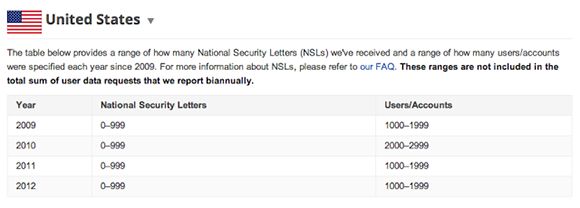This article is more than 1 year old
Google offers limited data on National Security Letters
'Yes, we received a few ... hundred'
Google has expanded its semiannual Transparency Report to include data about National Security Letters (NSLs) – albeit only a very small amount of data, given the strict secrecy that continues to surround the controversial documents.
NSLs are letters written by US government agencies – usually the FBI, but occasionally such outfits as the Pentagon and the CIA – demanding access to specific data pertaining to individuals, such as financial information or phone and email logs.
Technically, NSLs can only be used for investigations pertaining to national security. But although NSLs have been around since the late 1970s, their use was greatly expanded by the USA PATRIOT Act in response to the terrorist attacks of 2001.
What makes the use of NSLs so contentious is that the letters can be issued without court oversight and they come equipped with a gag order. The recipient of an NSL is forbidden under penalty of law from disclosing even the mere fact that the letter exists – not even to close friends or family.
That makes it difficult for companies like Google to share any meaningful information about the NSLs they receive, but the Chocolate Factory says it has managed to convince government agencies to let it tell us a little of what it knows.
"Starting today, we're now including data about NSLs in our Transparency Report," Richard Salgado, Google's director of law enforcement and information security, wrote in a blog post on Tuesday. "We're thankful to US government officials for working with us to provide greater insight into the use of NSLs."
But "greater insight," in this case, doesn't exactly amount to great insight. Google says it will only publish updated numbers on the NSLs it receives once a year and it will only share numerical ranges, rather than exact figures.
"This is to address concerns raised by the FBI, Justice Department and other agencies that releasing exact numbers might reveal information about investigations," Salgado wrote, adding that Google would only disclose its data "in broad strokes."

Draw whatever conclusions you will from Google's NSL disclosure. It's all the information you're going to get
Thus, for each year from 2009 to 2012, Google says it received anywhere between zero and 999 NSLs. For most of those years, the letters requested information on anywhere from 1,000 to 1,999 users or accounts.
The notable exception was 2010, when Google received NSLs requesting data from between 2,000 and 2,999 users – though the online ad-slinger offered no explanation for the increase, or why fewer users' data was requested in the following years.
The information on NSLs is only the latest to be added to Google's report on the requests it receives from governments, courts, and law enforcement agencies. Google last updated its report in January, with data from the period from July to December 2012.
As the company's Transparency Report FAQ explains, however, NSLs are really only the tip of the iceberg when it comes to information requests, and many similar sorts of requests won't be called out the way NSLs have been.
"Many governments may have legal processes similar to NSLs that allow them to obtain information for national security reasons," the FAQ states. "When Google receives these user data requests, we include them in the numbers we report biannually in our Transparency Report." ®
